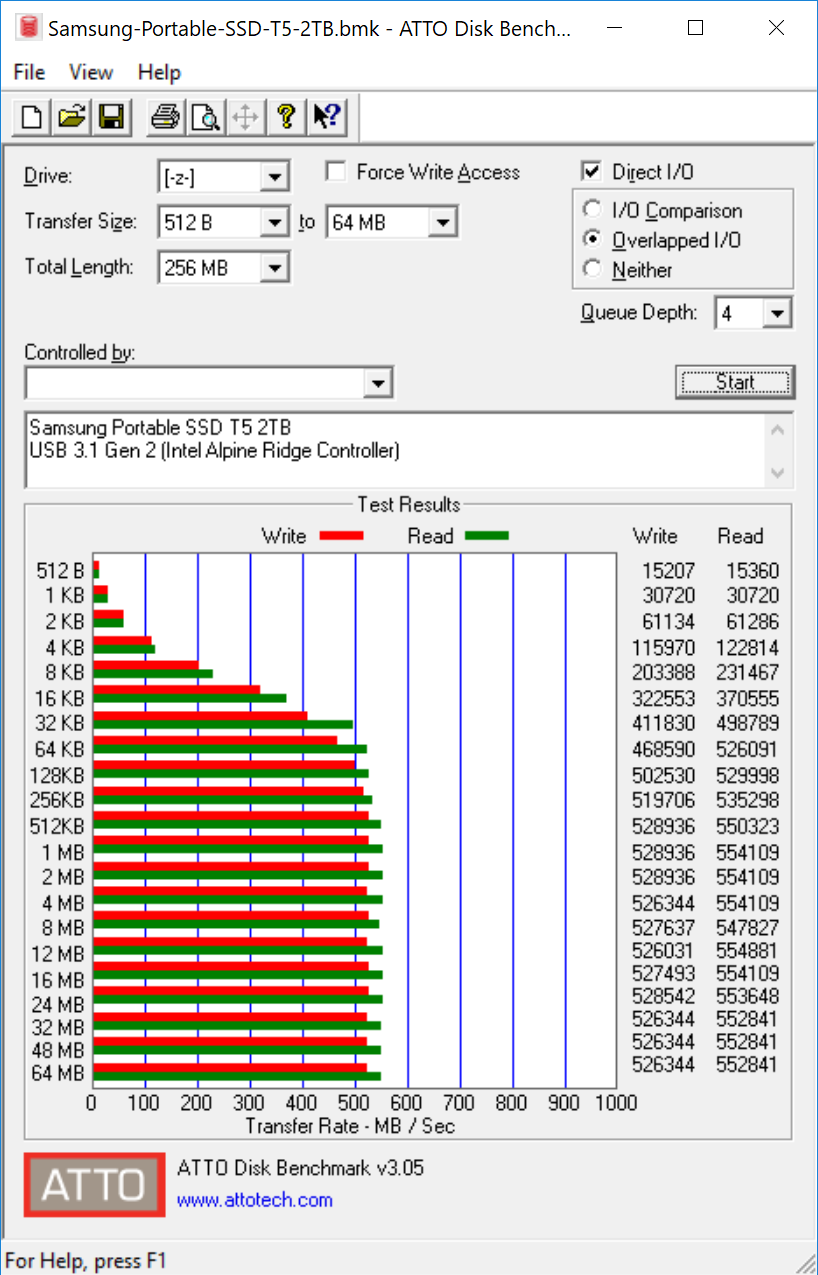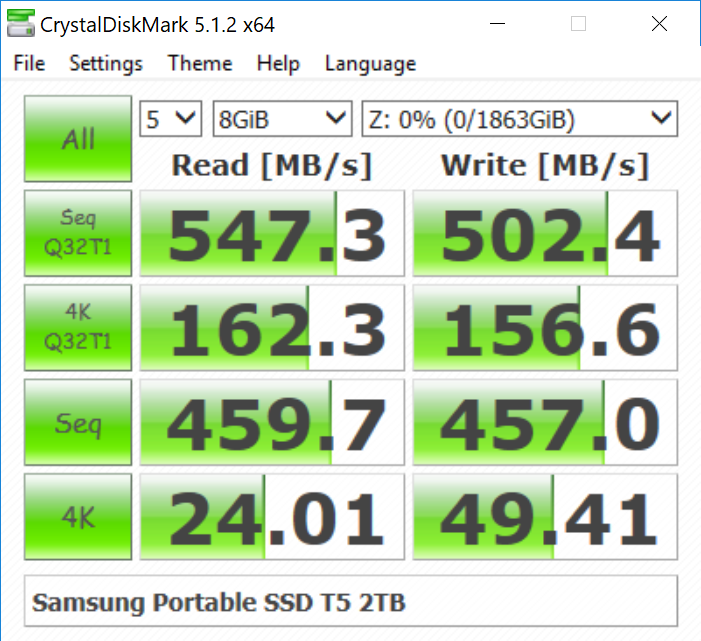Samsung Portable SSD T5 Review: 64-Layer V-NAND Debuts in Retail
by Ganesh T S on August 15, 2017 10:00 AM ESTSynthetic Benchmarks
Various synthetic benchmarks are available to quickly evaluate the performance of direct-attached storage devices. Real-world performance testing often has to be a customized test. We present both varieties in this review, starting with the synthetic benchmarks in this section. Prior to covering those, we have a quick look at our testbed setup and testing methodology.
Testbed Setup and Testing Methodology
Evaluation of DAS units on Windows is done with the testbed outlined in the table below. For devices with a USB 3.1 Gen 2 (via a Type-C interface) connections (such as the Samsung Portable SSD T5 that we are considering today), we utilize the USB 3.1 Type-C port enabled by the Intel Alpine Ridge controller. It connects to the Z170 PCH via a PCIe 3.0 x4 link.
| AnandTech DAS Testbed Configuration | |
| Motherboard | GIGABYTE Z170X-UD5 TH ATX |
| CPU | Intel Core i5-6600K |
| Memory | G.Skill Ripjaws 4 F4-2133C15-8GRR 32 GB ( 4x 8GB) DDR4-2133 @ 15-15-15-35 |
| OS Drive | Samsung SM951 MZVPV256 NVMe 256 GB |
| SATA Devices | Corsair Neutron XT SSD 480 GB Intel SSD 730 Series 480 GB |
| Add-on Card | None |
| Chassis | Cooler Master HAF XB EVO |
| PSU | Cooler Master V750 750 W |
| OS | Windows 10 Pro x64 |
| Thanks to Cooler Master, GIGABYTE, G.Skill and Intel for the build components | |
The full details of the reasoning behind choosing the above build components can be found here. The list of DAS units used for comparison purposes is provided below.
- Samsung Portable SSD T5 2TB
- Samsung Portable SSD T5 500GB
- ADATA SD700 512GB
- Corsair Voyager GS 512GB
- G-DRIVE slim SSD USB-C 500GB
- Samsung Portable SSD T3 2TB
- SanDisk Extreme 900 1.92TB
ATTO and Crystal DiskMark
Samsung claims speeds of up to 540 MBps, and it is backed up by the ATTO benchmarks provided below. Unfortunately, these access traces are not very common in real-life scenarios.

CrystalDiskMark, despite being a canned benchmark, provides a better estimate of the performance range with a selected set of numbers. As evident from the screenshot below, the performance can dip to as low as 24 MBps for 4K random read accesses. The 3x - 6x increase in performance at higher queue depths for these random accesses shows that UASP is active and working well.











38 Comments
View All Comments
melgross - Tuesday, August 15, 2017 - link
Heh, that’s true. I always thought that it was the OS itself that needed to have support for other file systems, not the other way around. So here it would be Google’s fault, but no one likes to blame them for anything, or Samsung either, for that matter.coder543 - Tuesday, August 15, 2017 - link
There are Linux drivers for exFAT, but device manufacturers do not ship exFAT support with Android because they don't want to pay Microsoft additional royalties over what they already have to pay them. (some info here: https://www.howtogeek.com/183766/why-microsoft-mak...coder543 - Tuesday, August 15, 2017 - link
https://www.howtogeek.com/183766/why-microsoft-mak...and AnandTech decided the closing parenthesis was part of the URL, so I've placed the link separately here.
Rocket321 - Tuesday, August 15, 2017 - link
I believe Samsung (and LG) android phones DO include an exFat driver out of the box. The stock aosp (ie Nexus/Pixels) do not.BillBear - Tuesday, August 15, 2017 - link
It's entirely possible that it's already covered under Apple and Microsoft's big patent cross licensing agreement.AnTech - Tuesday, August 15, 2017 - link
Is it possible to use Samsung Portable SSD T5 to boot Mac and work from it all-day-long?coder543 - Tuesday, August 15, 2017 - link
It should be, but why would you?AnTech - Tuesday, August 15, 2017 - link
To boot from Samsung Portable SSD T5 at work and home. Your stuff in your pocket. Always.Manch - Wednesday, August 16, 2017 - link
My buddy with the T3 drive keeps OSX on it. Uses VM to launch an instance of it on his XPS15. Works greatskavi - Tuesday, August 15, 2017 - link
If you can, wait for a portable Thunderbolt 3 SSD, speeds would be much closer to native.